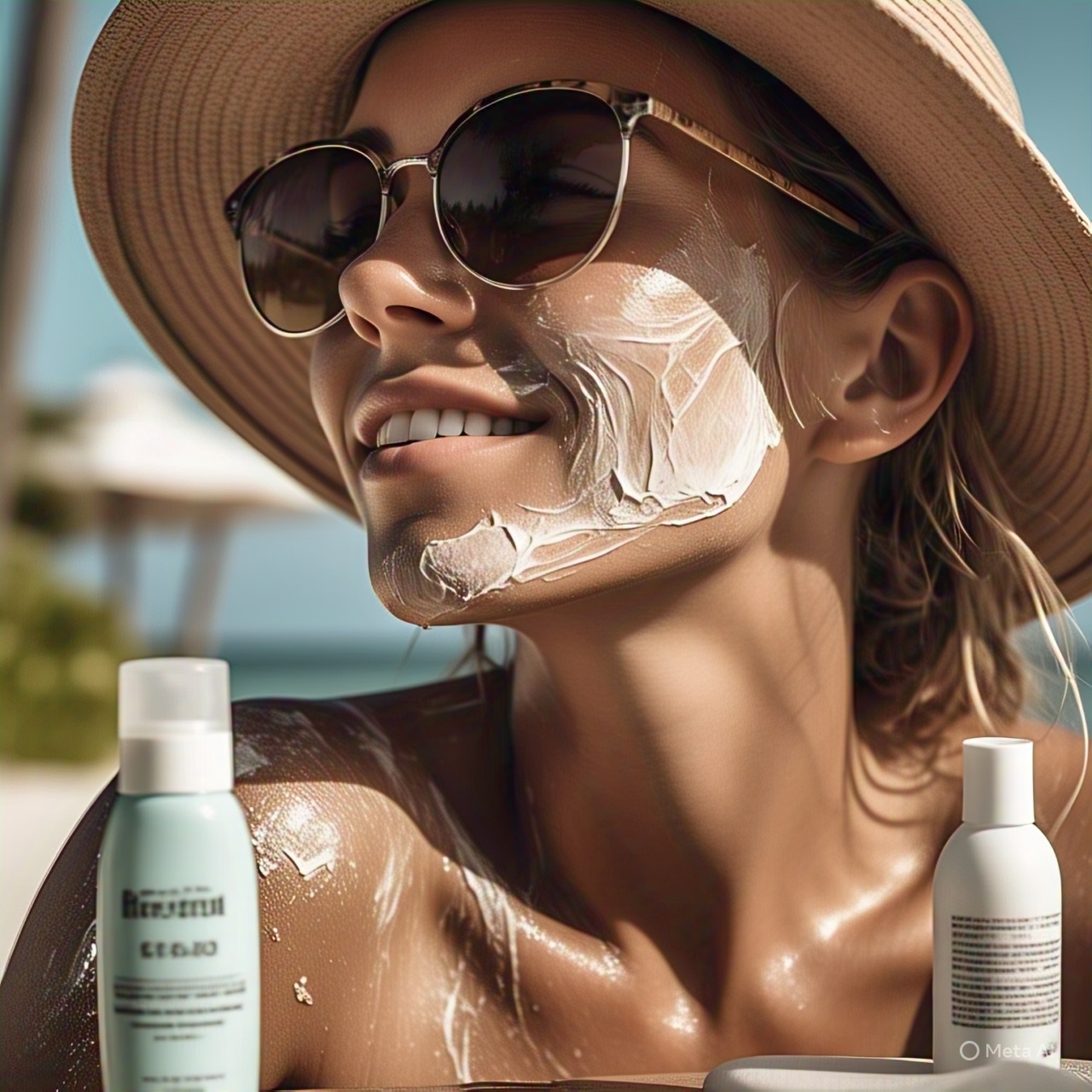Introduction
When you think about sunscreen, you probably picture beaches, blazing sun, and avoiding sunburns. But here’s the twist—sunscreen isn’t just for sunny days or tropical getaways. Especially if you have dry skin, this skincare superhero is doing way more behind the scenes than you might realize.
Dry skin is thirsty, flaky, and often super sensitive. And while most people slap on SPF to block UV rays, few know that it can also act like a secret hydration booster. Curious? You should be.
Sunscreen: More Than Just UV Armor
Yep, it protects against sun damage. But modern sunscreens are also loaded with hydrating ingredients, anti-inflammatories, and even barrier-repair agents. It’s like getting a 2-for-1 deal—UV protection and skincare magic.
Why Dry Skin Needs Special Attention
Dry skin isn’t just annoying—it’s vulnerable. Without the right protection, your skin can become a battlefield of redness, cracks, and irritation. That’s where the right sunscreen comes in. It’s not just a shield; it’s also a hydrating hug for your skin barrier.
Understanding Dry Skin
What Causes Dry Skin?
Dry skin can stem from:
- Cold or dry climates
- Over-cleansing or harsh products
- Genetics
- Aging
- Medical conditions like eczema
Your skin loses its ability to retain moisture, making it feel tight, rough, and sometimes itchy.
The Role of Environmental Stressors
Wind, pollution, UV rays, indoor heaters—all of them suck the life (and water) out of your skin. It’s not just about weather; it’s about what your skin has to fight every single day.
How Sunscreen Fits Into the Picture
Sunscreen adds a layer of protection not only from the sun but from other external nasties. It works like a topcoat for your skincare routine—sealing everything in and keeping dryness out.
Traditional Benefits of Sunscreen (The Basics)
UV Protection 101
We all know SPF protects against:
- UVA (aging rays)
- UVB (burning rays)
That’s a no-brainer. But for dry skin, these rays can accelerate damage and break down collagen faster than a dropped phone screen.
Preventing Premature Aging
Dry skin already shows wrinkles faster. Add UV rays to the mix, and it’s a fast track to fine lines and sagging. Sunscreen slows this aging train down.
Skin Cancer Prevention
Yes, it still matters—even for dry skin. You’re not exempt from skin cancer risk just because your skin’s flaky.
Unexpected Benefits of Sunscreen for Dry Skin
1. Acts as a Moisture Barrier
Sealing in Hydration
Many modern sunscreens have occlusive ingredients that help trap moisture in your skin. Think of it as saran wrap for your skincare—except breathable and way more elegant.
Boosting Skin Barrier Function
A compromised skin barrier is common in dry skin. SPF helps reduce transepidermal water loss (TEWL), keeping your skin resilient and happy.
2. Shields Against Harsh Environmental Factors
Protection from Wind, Cold, and Pollution
Cold wind is like sandpaper to dry skin. Sunscreen adds a buffer layer that blocks those elements from directly assaulting your delicate barrier.
SPF as a Skin Barrier Enhancer
Many formulas contain ceramides, glycerin, and hyaluronic acid—superstars for skin barrier repair.
3. Prevents Flare-Ups and Irritation
Especially for Sensitive and Eczema-Prone Skin
Dry skin is often reactive. The added protection from SPF prevents sudden flare-ups triggered by light, air, or allergens.
Calming Ingredients in Sunscreens
Look for sunscreens with niacinamide, aloe, or panthenol—they soothe and calm stressed-out skin.
4. Enhances the Effectiveness of Moisturizers
Locking in Layers
SPF acts like a lid, sealing in all the good stuff underneath—your serums, your moisturizers, your skin’s dignity.
Amplifying Skincare Results
The less your skin is stressed, the better your skincare works. SPF helps your treatments stay on course.
5. Reduces Redness and Inflammation
Anti-inflammatory Ingredients in Modern SPF
Sunscreens today aren’t just blocks—they’re treatments. Zinc oxide and titanium dioxide actually calm the skin and reduce inflammation.
Soothing Properties for Reactive Skin
No more redness roulette. A gentle SPF helps keep your tone even and comfortable all day.
What to Look For in a Sunscreen for Dry Skin
Hydrating Ingredients That Make a Difference
- Hyaluronic acid
- Glycerin
- Squalane
- Ceramides
These ingredients help nourish and retain moisture all day long.
Mineral vs. Chemical – Which is Better for Dry Skin?
- Mineral (zinc oxide, titanium dioxide): Great for sensitive, reactive dry skin.
- Chemical (avobenzone, octocrylene): Often lighter and more hydrating, but may irritate sensitive types.
Pick your fighter based on your skin’s attitude.
Avoid These Ingredients If You Have Dry or Sensitive Skin
- Alcohol
- Fragrance
- Harsh preservatives (like parabens or formaldehyde releasers)
These can make dryness worse or trigger irritation.
How to Layer Sunscreen with Other Skincare Products
The Ideal Morning Skincare Routine
- Cleanser (gentle, non-foaming)
- Hydrating toner or mist
- Serum (like hyaluronic acid or niacinamide)
- Moisturizer
- Sunscreen (SPF 30+)
When to Apply Sunscreen in Your Regimen
Last step before makeup, first step before exposure. Think of it as the final layer of armor.
Tips for Reapplication Without Drying Out Skin
- Use a hydrating SPF mist
- Try cushion SPF compacts
- Layer gently—don’t rub away your base
Myths About Sunscreen and Dry Skin
“It Makes My Skin Flakier”
Not true—wrong formulation is the problem. A hydrating SPF should actually reduce flakes, not cause them.
“I Don’t Need It Indoors or in Winter”
UV rays pass through windows, and blue light from screens is real. Also—wind and heaters dry you out indoors too!
“Sunscreen Replaces Moisturizer”
Not so fast. Unless it’s formulated as both, sunscreen alone isn’t enough. Always moisturize before applying SPF.
Choosing the Best SPF for Your Skin Type
Lightweight Formulas for Everyday Use
Look for:
- Gel-creams
- Emulsion-style SPFs
- Milk-type formulas
Tinted SPF for Extra Nourishment and Coverage
Bonus: Tinted sunscreens often have added antioxidants and give a dewy finish—great for dry skin and dull complexions.
Dermatologist-Recommended Brands to Try
- La Roche-Posay Anthelios Melt-In Milk
- CeraVe Hydrating Mineral Sunscreen
- EltaMD UV Daily
- Neutrogena Hydro Boost SPF 50
- Supergoop! Glowscreen
Real User Experiences and Testimonials
What People With Dry Skin Are Saying
“I thought SPF dried me out more, but switching to a hydrating one actually calmed my eczema!”
“I stopped getting flaky patches in winter once I started using sunscreen daily.”
Transformations After Regular SPF Use
- More even tone
- Less inflammation
- Softer texture
- Stronger skin barrier
Conclusion
Sunscreen is the unsung hero of dry skin care. Beyond just blocking UV rays, it offers a whole host of benefits—locking in moisture, calming inflammation, shielding from environmental stressors, and boosting your skincare game.
If you’ve been skipping SPF because you thought it didn’t “do anything” for dry skin—think again. The right sunscreen might just be the missing piece in your hydration puzzle.
FAQs
Can sunscreen really help dry skin feel less tight?
Absolutely! Many sunscreens contain occlusive ingredients that help seal in moisture, leaving skin feeling more comfortable.
What SPF level is best for daily use on dry skin?
Go for SPF 30 or higher, and choose one with added hydration boosters like glycerin or squalane.
Is it okay to skip moisturizer if my sunscreen is hydrating?
Sometimes, yes—but double layering offers more protection and long-term hydration.
Should I reapply sunscreen even if I’m indoors?
If you’re near windows or using screens a lot, reapplying every few hours is still beneficial.
Can I use sunscreen at night for dry skin benefits?
While not necessary, some hydrating SPFs can act like moisturizers overnight—but typically, nighttime creams are better suited for deep repair.






